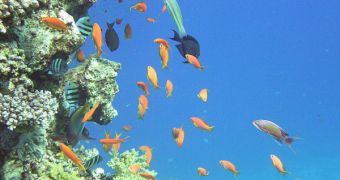The acidification of oceans is one of the most pressing concerns that trouble scientists, along with increased levels of pollutants being spilled in the waters everyday. This is bad news especially for coral reefs, which stand to be destroyed by both algae and sand moving in, as well as by increased quantities of carbon trapped under the waters.
Storms are in the habit of cleaning our atmosphere, while they also wreck havoc among our homes. They trap immense quantities of carbon dioxide in rain drops and transfer it to rivers, from where the CO2 is directed to the oceans, where it's buried underwater. In the process, heavy rain also washes down carbon on plants and on the ground, so there are thousands of tons of the dangerous chemical reaching the water after every typhoon, monsoon, tornado or hurricane.
But while this is good news for our atmosphere, it's also very bad news for the marine ecosystem, which is currently struggling to maintain its very delicate balance. This balance is especially prone to "tipping" in areas around coral reefs, where hundreds of fish, bird and microscopic algae species are dependent on the well-being of the reefs for their very survival.
Increasing amounts of carbon in the water trigger the formation of carbonic acid, which, in turn, causes the water to change its pH, from alkaline to acidic. This causes severe chemical imbalances in already-established habitats, which are ruined. Sand and algae move in, around and over coral reefs, while fish species are left without their regular breeding grounds.
Thus, they become easy targets for new predators, which enter niches formed in the ecosystems with the disappearance of their usual inhabitants. This state of affairs causes the corals to lose their microscopic algae friends, which give them their color, and which are also indispensable for the very survival of the corals. When these algae go, reefs start to bleach, erode, and, once the damage is done, the process becomes irreversible.
"A significant lowering of ocean pH would mean potentially massive coral loss. That would lead to the death of countless marine species as well as the devastation of economies dependent on ocean health and productivity. But, more importantly, it would remove the livelihoods of hundreds of millions of people around the globe who depend on reefs for food, income, coastal protection and stability," says Dr Rod Salm, who is the director of The Nature Conservancy's Tropical Marine Conservation Program, for the Asia-Pacific region.

 14 DAY TRIAL //
14 DAY TRIAL //